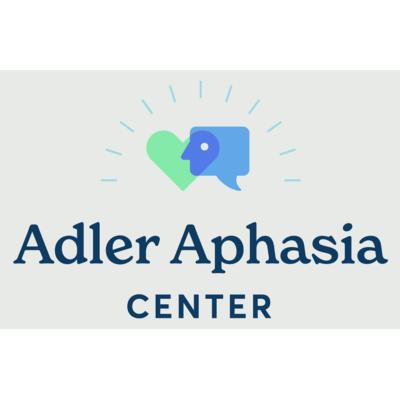Adler Aphasia Center
Telehealth In-Person
(201) 368-8585
Maywood

Our Mission is to Enrich The Lives Of People With Aphasia, Their Families, And Communities.
What Is Aphasia?
Aphasia is a language disorder that can affect a person’s ability to speak, understand spoken language, read, and write. Aphasia is usually caused by stroke, traumatic brain injury, or brain disease.
This frustrating condition affects a person’s ability to communicate but typically does not affect his or her intellect. It’s important to remember that a person with aphasia knows what they want to say, it’s just hard to find the words. Someone’s internal thinking remains; the ability to access and express those ideas is impacted.
Full-Service Program
- Discussion groups (to engage in conversation and practice new strategies with others with similar communication challenges)
- Topic-based groups such as book club, travel, comedy, history, movies, etc.
- One-on-one computer sessions with a volunteer
- Group-based technology sessions using iPads
- Performing arts activities such as choral singing, Improv, mock court, drama, etc.
- Wellness activities such as art, yoga, exercise, gardening, cooking, etc.
- Support groups (offered as separate sessions for people with aphasia and for caregivers)
- Advocacy projects and aphasia education training sessions
Aphasia Communication Groups
Participants learn effective communication strategies, make new social connections with other people who also have aphasia, and build their confidence and self-esteem. The Aphasia Communication Groups meet twice a month for two hours per session and are facilitated by Adler-trained Speech-Language Pathologists. These groups offer rolling admission so a person with aphasia may join a group at any time.
These groups can:
- strengthen communication skills
- build relationships with other people with aphasia
- provide an online community for support
- build self-esteem
Caregiver Support Groups
Our Center is dedicated to improving the quality of life for them as well, through professional support. The Center’s unique caregiver support groups help to build a strong social network with other caregivers and include coping strategies and ways to find respite.
For more information about our caregiver program and support groups, contact [email protected]
| Age Groups |
|
| Community Services |
Arts & RecreationEmployment / TrainingFamily & Support Services |
| Health Services |
Behavioral / Mental HealthIntellectual and Developmental NeedsMedical |
| Treatment Services |
Outpatient ServicesTreatment Settings
|
| Payment Types |
|
| Areas Served |
|
Last Updated: 05/09/25
